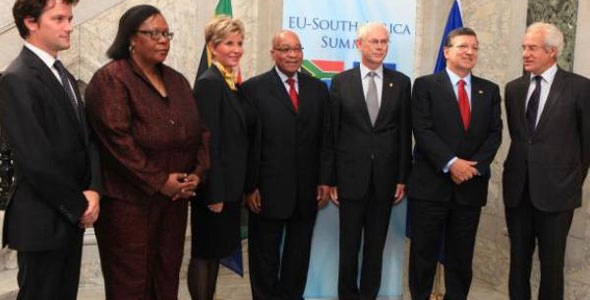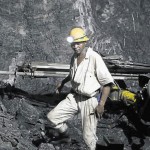Pretoria – The 6th South Africa-European Union (SA-EU) Summit ended on Thursday, with leaders in agreement that joint programmes were needed to address the common challenge of job creation.
In a joint communiqué issued after the summit, South African President Jacob Zuma, EU Commission President José Manuel Barroso and European Council President Herman Van Rompuy said education and training were the key factors which contributed to job creation and economic growth.
In that regard, the two sides vowed to take their education and training cooperation to the next level under the Youth Employment Accord and promote technical support and exchange programmes for youth development.
“We will continue high level discussions on addressing the shared challenges of youth employment, as well as the way which skills and training can contribute to South Africa’s infrastructure expansion.
“Under the EU financed development programme, approximately R650 million/ €50 million remains available to support job creation initiatives,” reads the communiqué.
With the summit’s central theme being ‘Job Creation through Inward Investment’, Zuma said South Africa still faced the inherited challenges of unequal wealth and resource distribution, inequality, unemployment and deeply entrenched poverty.
“We are of the firm view that given these realities, the EU should continue its development programmes in South Africa, complementing as they do the work of government within a developmental framework,” said Zuma.
Barroso said Europe was also still working on addressing the scourge of youth unemployment. Given that South Africa was also working to promote growth and jobs in order to diversify its economy to ensure that its development is inclusive, the two sides, Barroso said, could both benefit from working more together to face these challenges.
“I would even say that Europe is South Africa’s natural partner to do it. South Africa is now an emerging economy with different types of needs, so we must adapt our cooperation accordingly.
“But certainly, we want to keep development cooperation with South Africa. This is why I have proposed to focus our future cooperation on job creation, education, skills and innovation and capacity development,” said Barroso.
Energy pact signed
The summit also saw South Africa and the European Atomic Energy Community sign an agreement of cooperation on the use of nuclear energy.
The deal, which was signed by the new Minister of Energy, Ben Martins, will among other things, see an intensified roll out of rural electrification, with an initial target of 300 000 households in the remote areas of SA.
Parties to the deal also agreed on a new R1.3 billion support programme to blend grants with loans from the Development Bank of Southern Africa and the European Development Finance Institutions to support South Africa’s infrastructure programmes.
Narrowing the trade deficit
The summit also touched on the trade deficit, which is in favour of the EU. Leaders agreed to cement growth by remaining committed to “open and transparent trade” rules, and agreed to work on policies that promote bilateral trade and investment that is mutually beneficial.
Total trade with EU countries last year was R383 billion, compared to R419 billion in 2008. In 2008, SA exported R186 billion worth of goods, which fell to R122 billion in 2009.
Imports from the EU, however, have recovered to more than the levels that they reached in 2009. Imports were R233 billion in 2008, while they were R239 billion last year.
At least 2 000 EU companies have invested over R60 billion in foreign direct investment (FDI) and has created 350 000 direct jobs in South Africa.
Zuma said they remained concerned about the trade deficit, which is largely in Europe’s favour. To that end, they have “urged ministers and the commissioners of the EU to work harder on the removal of non-tariff barriers to trade”.
With regards to the “upgraded surveillance” on citrus black spot in the export of South African produce to Europe, Barroso said negations were on-going, and he was confident that a mutually beneficial agreement would soon be reached.
SA had cautioned that the “upgraded surveillance” would greatly affect the South African citrus industry, which exports around 100 million cartons to 45 countries, generating R6 billion in foreign exchange.
This would also lead to job losses as the industry employed 40 000 permanent workers and 40 000 seasonal workers.
EPA deadline
The leaders also discussed the October 2014 deadline imposed by the EU for the conclusion of the economic partnership agreement (EPA) with the Southern African Development Community (SADC) countries. The EPA gives the SADC countries preferential market access for their agricultural and agro-processed products.
South Africa had warned that the threat of withdrawing preferential market access for products from SA and neighbouring countries such as Botswana, Namibia and Swaziland, if the EPA was not finalised, would have devastating socio-economic consequences, as it would lead to significant job losses.
“We agreed that the negotiations should conclude shortly. We reaffirmed the importance of reaching an agreement that is mutually beneficial, enhances growth and generates jobs, and supports development and integration in Southern Africa,” said the communiqué.
The leaders were convinced that common ground could be found on the pending issues, and urged the negotiators to expedite their work.
Supporting peace efforts
The summit also touched on global issues such as climate change, human rights and the troubled areas including Syria, Madagascar, Egypt, the Great Lakes region and Zimbabwe.
On Zimbabwe, the leaders jointly hoped that the elections that will be held on 31 July will be peaceful and transparent.
Van Rompuy said the EU supported the mediatory efforts by President Zuma and SADC to forge an agreement between the squabbling political parties.
According to Van Rompuy, the EU will respond to the outcome of the elections on the basis of all evidence of peaceful and transparent elections, with results that are accepted by all.
“We look forward to normalisation of relations and deepening out partnerships with Zimbabwe,” he said.
Over all, the leaders noted that relations between the two sides were sound, describing them as “being at a mature stage”. The two sides saw each other as powerful engines to boost and benefit both economies.
“Our strategic partnership with South Africa is also an integral part of our special relationship with the African continent,” said Borroso.
The 7th Summit will be hosted by the EU in 2014. – SAnews.gov.za








